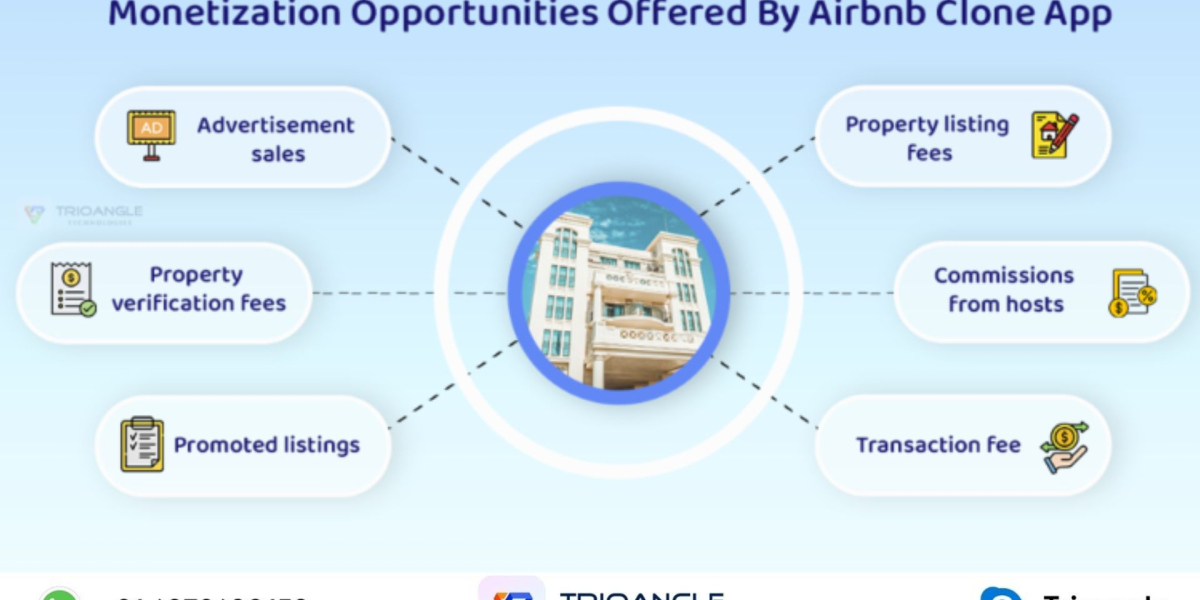Introduction
The travel and hospitality industry has been reshaped by technology over the past decade. Travelers today are no longer dependent only on hotels; they seek flexible, affordable, and unique stays through short-term rentals. This shift has given rise to platforms like Airbnb, which disrupted the accommodation market by connecting hosts and guests on a global scale.
For entrepreneurs looking to tap into this booming sector, launching an Airbnb clone or a vacation rental script has become one of the most practical and profitable approaches. These ready-made solutions replicate the core functionalities of Airbnb, enabling startups to build their own short-term rental marketplace without the high cost and time of developing from scratch.
But beyond offering convenience to users, the real power of an Airbnb clone app lies in its monetization opportunities. By implementing the right revenue models, businesses can create a sustainable income stream while helping hosts generate earnings and travelers find quality stays.
In this blog, we’ll explore what an Airbnb clone is, and then break down the most effective monetization methods, including advertisement sales, property verification fees, promoted listings, property listing fees, commissions from hosts, and transaction fees.
What is an Airbnb Clone?
An Airbnb clone is a digital platform or mobile app designed to mimic the functionalities of Airbnb. It connects property owners (hosts) with travelers (guests) for short-term stays, long-term rentals, or even experiences.
Typically developed as a vacation rental script, this solution comes preloaded with features like:
Property listing and search filters
Secure booking and payment systems
User reviews and ratings
Host and guest dashboards
Messaging and notifications
Unlike building an app from the ground up, an Airbnb clone allows entrepreneurs to launch quickly, customize easily, and scale affordably. And most importantly, it comes with multiple built-in opportunities for revenue generation.
Monetization Opportunities of Airbnb Clone App
1. Advertisement Sales
As your platform grows, advertisers will want to reach your audience. Selling ad space becomes one of the easiest and most profitable revenue models for your Airbnb clone app.
Banner Ads: Display travel-related ads such as airlines, travel insurance providers, or local tour operators.
Sponsored Placements: Offer advertising slots to hotels or property managers looking for visibility.
Ad Networks: Integrate third-party ad networks like Google AdSense for automated ad monetization.
By strategically placing ads, you not only diversify income but also maintain a free or low-cost experience for users.
2. Property Verification Fees
Trust plays a vital role in the vacation rental industry. Guests want assurance that the property they are booking is genuine. By offering a verification service and charging hosts a property verification fee, you can:
Enhance platform credibility.
Give verified hosts higher chances of getting bookings.
Offer peace of mind to travelers.
A small verification fee for document checks, photographs, or inspections adds a steady income stream while improving brand trustworthiness.
3. Promoted Listings
Hosts are always competing for visibility. By offering promoted listing options, you give them the chance to stand out in search results for a fee.
Priority Placement: Paid listings appear at the top of results.
Seasonal Promotions: Hosts can pay extra during high-demand seasons.
Tiered Packages: Basic, premium, and exclusive levels of exposure.
This method benefits both the host (higher booking potential) and the platform owner (consistent income).
4. Property Listing Fees
A tried-and-tested approach is charging hosts a listing fee to publish their properties on the platform. This can be structured in different ways:
One-time Listing Fee: A fixed charge for every property uploaded.
Subscription Plans: Monthly or annual packages where hosts can list multiple properties.
Freemium Model: Free basic listings with limited features, while premium listings come with more visibility and perks.
Property listing fees work particularly well once your Airbnb clone app gains a steady flow of users and bookings.
5. Commissions from Hosts
The commission model is the backbone of Airbnb’s success and can be replicated in your Airbnb clone app.
A percentage is charged on each successful booking.
The rate can vary depending on the property type, host category, or booking volume.
This aligns the platform’s growth with the host’s success — the more bookings they get, the more revenue you earn.
This is a scalable and proven monetization model for any vacation rental script.
6. Transaction Fees
In addition to commissions, you can charge transaction fees to guests during the booking process.
Guests may pay a small service fee (e.g., 5–10% of booking value).
This helps cover payment processing costs and platform maintenance.
Many travelers are accustomed to such fees, as they are standard across booking platforms.
When communicated transparently, transaction fees provide a strong additional revenue channel without discouraging bookings.
Why Diversifying Monetization Matters
Relying solely on one income source can make a platform vulnerable to seasonal fluctuations or market shifts. By combining advertisement sales, verification fees, promoted listings, commissions, listing charges, and transaction fees, your Airbnb clone app creates a balanced revenue ecosystem.
For example:
During holiday seasons, promoted listings and commissions generate high earnings.
In low-demand periods, ad revenue and subscription-based listing fees keep the cash flow steady.
This multi-pronged approach ensures long-term sustainability and growth for your business.
Conclusion
Launching an Airbnb clone app or a vacation rental script is not just about replicating a popular business model — it’s about creating a profitable ecosystem that benefits both hosts and travelers. With smart monetization strategies, you can transform your platform into a scalable revenue-generating business.
From advertisement sales and property verification fees to promoted listings, property listing charges, commissions, and transaction fees, the opportunities are diverse and flexible. The more value you provide to your users, the more they are willing to invest back into your platform.
If you’re an entrepreneur planning to enter the short-term rental market, focus on building a secure, trustworthy, and user-friendly platform. Combine it with multiple monetization channels, and your Airbnb clone app will not only thrive but also stand out in a competitive travel industry.







